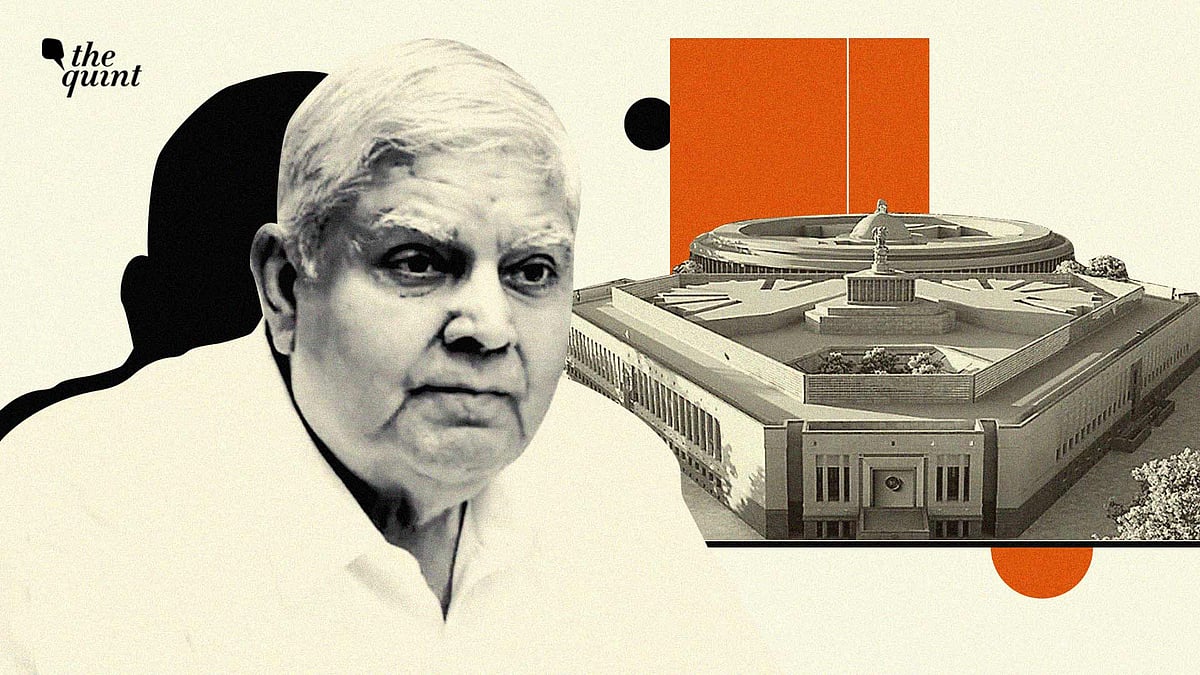
Jagdeep Dhankhar’s Resignation Is No Surprise If You’ve Been Watching Closely
Dhankhar's controversial legacy will be remembered for its acrimony and allegations of political bias.

advertisement
He may not have inspired a great deal of awe, but Jagdeep Dhankhar has certainly managed to produce shock—with his words, with his actions, with his blithe disregard for the political neutrality of his post as the Vice-President of India and the Chairman of the Rajya Sabha.
On Monday night, Dhankhar, 74, delivered yet another shock as he resigned from his august post after attending a seemingly uneventful first day of the Monsoon Session of Parliament.
Hard to believe though it is, Dhankhar, who rarely lost an opportunity to bat for the government in general and the Bharatiya Janata Party (BJP) in particular, is said to have fallen foul of the powers that be, and that is what may have sparked his decision to quit.
From Judiciary Critic to Political Crusader
If this is true, Dhankhar will doubtless see it as a cruel irony. For here is a man who will be remembered as the most partisan of all Rajya Sabha chairs India has witnessed so far.
With his big frame hunched over his high desk and his voice rasping with indignation, Dhankhar seemed to revel in making controversial remarks, infuriating the Opposition, and perhaps earning silent approval from the ruling party.
Consider a few remarkable highlights of Dhankhar’s fractious tenure: In 2022, soon after he was appointed VP, he said that the Supreme Court’s 2015 judgment striking down the National Judicial Appointments Commission Act (NJAC) was a “glaring instance” of “severe compromise” of parliamentary sovereignty and disregard of the “mandate of the people”.
Again, in April this year, he took great umbrage at the Supreme Court setting a three-month deadline for the President to decide on bills referred by state Governors. “There is a directive to the President by a recent judgement. Where are we heading? What is happening in the country,” he queried in consternation.
A Rajya Sabha Chair Who Took Sides
In August 2023, Dhankhar declared that he “could not and would not” direct Prime Minister Narendra Modi to be present in the House when Opposition benches demanded that the latter address them on the issue of the violence in Manipur.
In 2024, when the Opposition clamoured for a discussion on the farmers’ protests, he accused them of shedding “crocodile tears”.
His apolitical role notwithstanding, Dhankhar has never shied away from making political remarks. Without naming him, he has insinuated that Rahul Gandhi, the Leader of Opposition in the Lok Sabha, is “part of the enemies of the nation”. He has also stated in the House that the RSS had “unimpeachable credentials”, and that it was "a global think-tank of the highest order."
Echoes from Bengal: The Governor Who Battled Mamata
The Opposition members were so incensed with Dhankhar’s conduct that in December last year, they sought to remove him by submitting a no-confidence motion against him. That attempt came to nought, but Dhankhar now has the dubious distinction of being the first chairman of the Rajya Sabha to face the prospect of a vote of no-confidence.
As governor, which is again a largely ceremonial constitutional post, he set himself up to be a thorn in the side of the Trinamool Congress government led by Chief Minister Mamata Banerjee.
From fulminating against the state’s law and order situation (and, on occasion, becoming dramatically tearful), to trying to block the appointments of vice-chancellors at state universities, he kept up an unseemly war of attrition with the state government throughout his stint.
Why the Shock Resignation Might Not Be About Health
Dhankhar, a lawyer who launched his political career with the Congress, and then shifted to the Janata Dal and thence to the BJP, is obviously a shrewd politician who knows how to reap the rewards of his devotion to the party top brass. And yet there are now rumours swirling around that he had incurred its wrath and so had to step down.
The coming days will reveal if it was indeed ill health that prompted Dhankhar to resign or if it was because he had done something to incur the displeasure of his political mothership.
What is beyond debate, however, is his controversial legacy as the 14th Vice-President of India, a legacy that will be remembered for its acrimony and allegations of political bias.
(Shuma Raha is a journalist and author. She tweets @ShumaRaha. This is an opinion piece and the views expressed are the author’s own. The Quint neither endorses nor is responsible for them.)
- Access to all paywalled content on site
- Ad-free experience across The Quint
- Early previews of our Special Projects
Published: undefined